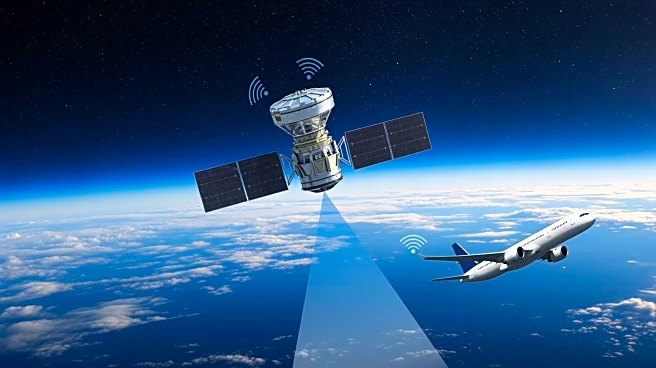What's Happening?
SpaceX has announced the acquisition of an additional $2.6 billion worth of wireless spectrum licenses from EchoStar, expanding a previous $17 billion deal. This move is part of SpaceX's strategy to grow
its satellite internet service, Starlink, which has now surpassed 8 million customers globally. The company has also secured a significant partnership with International Airlines Group, which will install Starlink's inflight internet on over 500 aircraft, including those of British Airways, Iberia, and Aer Lingus. This expansion into the aviation sector follows previous deals with airlines such as Hawaiian Airlines and United Airlines, further solidifying Starlink's presence in the industry.
Why It's Important?
The expansion of Starlink's spectrum and its growing partnerships with major airlines highlight SpaceX's aggressive push to dominate the satellite internet market. This development is significant for the U.S. technology sector, as it positions SpaceX as a key player in global internet connectivity, potentially challenging traditional telecom providers. The increased availability of high-speed internet on flights could transform passenger experiences and set new standards for inflight connectivity. Additionally, the acquisition of spectrum from EchoStar, influenced by directives from the Trump administration, underscores the strategic importance of satellite communications in national policy.
What's Next?
SpaceX's continued expansion in the satellite internet market is likely to prompt competitive responses from other telecom and satellite companies. The integration of Starlink into more commercial aircraft is set to begin in 2026, which could lead to further partnerships and technological advancements in inflight connectivity. As SpaceX continues to grow its customer base, regulatory scrutiny and international competition may increase, potentially influencing future business strategies and spectrum acquisitions.
Beyond the Headlines
The acquisition of spectrum licenses and expansion into the aviation sector may have broader implications for global internet access, particularly in remote and underserved regions. Starlink's ability to provide high-speed internet via satellite could play a crucial role in bridging the digital divide, offering connectivity solutions where traditional infrastructure is lacking. This development also raises questions about the future of telecommunications, as satellite-based services become more prevalent.












